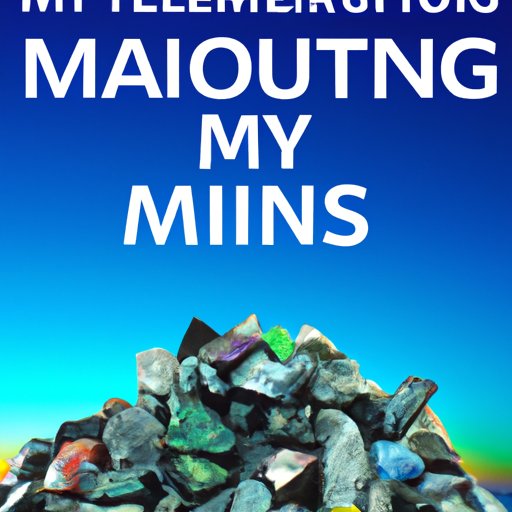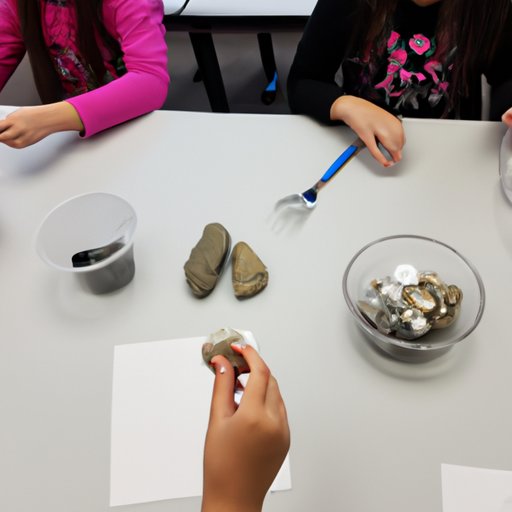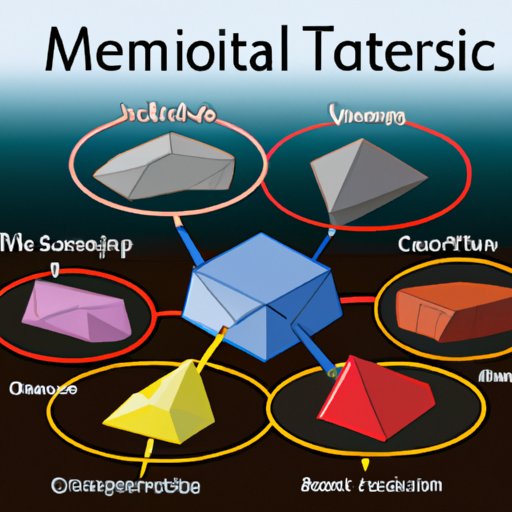Introduction
Minerals are substances that are found in the earth. They are essential for the human body to function properly and are a key component of many everyday items, including rocks, soil, and water. But what exactly does mineral mean?
In its simplest terms, a mineral is a naturally occurring substance with a definite chemical composition and crystal structure. Minerals can be either elements or compounds, meaning they contain one type of element or a mixture of different elements. Minerals are essential components of rocks and soils, and they can also be found in water and air.
The study of minerals is known as mineralogy. Mineralogists study the physical and chemical properties of minerals, as well as how they form and how they interact with other substances. This knowledge can be used to identify minerals, determine their origin, and understand their uses.

A Comprehensive Guide to Minerals: What They Are and How They Impact Our Lives
Minerals are vital to life on earth. They are essential to the formation of rocks and soils, and they are also present in water and air. In addition, minerals provide important nutrients for plants and animals, including us humans. Minerals can be found in foods, supplements, and a variety of everyday items.
Minerals are typically divided into two main categories: major minerals and trace minerals. Major minerals, such as calcium, magnesium, and potassium, are needed in larger amounts by the body. Trace minerals, such as iron, zinc, and selenium, are needed in smaller amounts.

Exploring the Different Types of Minerals and Their Uses
Minerals have a wide range of uses in our everyday lives. Here are some examples of the different types of minerals and their uses:
Major Minerals
Calcium: Calcium is a major mineral found in milk, cheese, yogurt, and green leafy vegetables. It is essential for strong bones and teeth, and it also helps muscles contract and nerves send messages throughout the body.
Magnesium: Magnesium is found in nuts, seeds, legumes, and whole grains. It helps regulate blood pressure and glucose levels, and it is also essential for nerve and muscle function.
Potassium: Potassium is found in potatoes, bananas, and citrus fruits. It helps regulate fluid balance, and it is also important for heart health and muscle contraction.
Trace Minerals
Iron: Iron is found in meat, poultry, fish, legumes, and fortified cereals. It helps produce red blood cells and carries oxygen throughout the body.
Zinc: Zinc is found in oysters, beef, pork, and fortified cereals. It helps with wound healing and immune system function, and it is also important for proper growth and development.
Selenium: Selenium is found in seafood, Brazil nuts, and eggs. It helps protect cells from damage, and it is also important for thyroid health.

An Introduction to Mineralogy: The Science Behind Minerals
The science of mineralogy dates back to the 17th century, when scientists began to study the properties and compositions of minerals. Today, mineralogists use a variety of techniques to identify minerals, including x-ray diffraction, optical microscopy, scanning electron microscopy, and energy-dispersive spectroscopy.
Mineralogists also classify minerals based on their physical and chemical properties. Minerals are typically divided into eight categories: native elements, sulfides, oxides, halides, carbonates, sulfates, phosphates, and silicates. Each category has its own unique characteristics, which can help mineralogists identify them.
In addition, mineralogists have identified a number of interesting facts about minerals. For example, there are more than 4,000 known minerals, and new ones are being discovered all the time. Also, some minerals can only be found in certain parts of the world, while others can be found almost anywhere.
The Benefits of Mineral Supplements: Why We Need Them
Minerals are essential for good health, but many people don’t get enough of them from their diet. To ensure they are getting the necessary amount of minerals, some people take mineral supplements. These supplements provide concentrated doses of essential minerals, such as calcium, magnesium, and zinc.
It is important to understand the role of minerals in nutrition and health. Minerals help maintain healthy bones, teeth, and soft tissues, and they are also important for metabolism, energy production, and hormone regulation. In addition, minerals play a role in the body’s defense against disease.
Common mineral supplements include multivitamins, calcium citrate, magnesium oxide, and zinc gluconate. It is important to talk to your doctor before taking any kind of supplement, as there can be potential side effects, such as upset stomach, nausea, and headaches.
Conclusion
Minerals are essential components of rocks, soils, water, and air, and they are also important for nutrition and health. There are two main types of minerals: major minerals and trace minerals. Major minerals, such as calcium, magnesium, and potassium, are needed in larger amounts by the body, while trace minerals, such as iron, zinc, and selenium, are needed in smaller amounts.
Minerals have a wide range of uses, from building materials to food additives. The science of mineralogy is used to identify and classify minerals, and mineral supplements can be taken to ensure adequate amounts of minerals are consumed. Understanding what minerals are and how they impact our lives is essential for optimal health.
In summary, minerals are naturally occurring substances that are essential for life on earth. They are found in rocks, soils, water, and air, and they can also be found in food, supplements, and everyday items. They are divided into two main categories: major and trace minerals, each of which has its own unique uses and benefits. Finally, the science of mineralogy is used to identify and classify minerals, and mineral supplements can be taken to ensure adequate amounts of minerals are consumed.
(Note: Is this article not meeting your expectations? Do you have knowledge or insights to share? Unlock new opportunities and expand your reach by joining our authors team. Click Registration to join us and share your expertise with our readers.)
